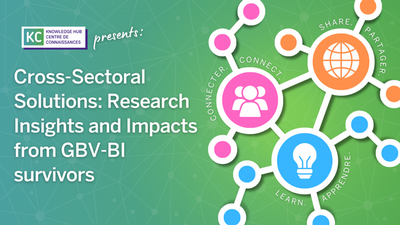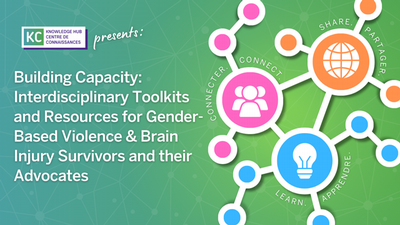Cross-Sectoral Solutions: Strengthening Community Capacity to Address the ‘Parallel Pandemic’ of Gender-Based Violence-Related Brain Injury Through a Survivor-Led Support Program
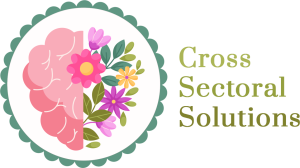
Traumatic Brain Injury (TBI) and Gender-Based Violence (GBV)
Currently most traumatic brain injuries that are sustained as a result of intimate partner violence as not recognized or treated. Shining a light on the Unseen: The intersections of interpersonal violence & traumatic brain injuries provides an overview of traumatic brain injuries that occur as a result of physical force (e.g. hit to the head, strangulation, asphyxiation). TBIs can result in cognitive, physical emotional or behavioural impairments that lead to temporary or permanent changes in functioning. Survivors experience brain injuries as a result of GBV struggle with many daily living activities, including work, social activities, laundry, meal preparation, taking medication, remembering appointments, paying bills, etc. In addition, survivors of GBV must also navigate complex systems, including health care & legal systems.
To understand the needs of survivors of GBV who have experienced traumatic brain injury we conducted a scoping review of research literature to understand IPV awareness of rehabilitation service providers, the types and contexts of rehabilitation care currently available for IPV survivors, and opportunities for rehabilitation care. We found that across rehabilitation professions there is a noted lack of education about IPV but a desire to learn more. Further education is required related to adequately identifying survivors of IPV, developing in-depth safety planning and ensuring that survivors are referred to necessary supports within the community (Toccalino et al, 2024). Other recommendations identified through the literature review included:
- importance of a non-judgmental and trauma-informed approach to supporting survivors
- raise awareness among rehabilitation workers and institutions of local resources for referrals
- enhanced collaboration with other disciplines to support holistic care for survivors
- client-centred approach to service delivery, involving clients in all aspects of their care planning (Toccalino et al 2024).
As a result of this review, 3 system-level changes to better support rehabilitation professionals throughout their training and careers are recommended:
- Educational institutions should review and revise their curricula to ensure all rehabilitation professionals graduate with at least some awareness of IPV and its connection with brain injury
- Accreditation bodies responsible for continuing education credits are encouraged to include and promote offerings covering IPV
- Cross-sectoral collaboration within healthcare and between healthcare and IPV services (Toccalino et al, 2024).
The Cross-Sectoral Solutions: Strengthening Community Capacity to Address the ‘Parallel Pandemic’ of Gender-Based Violence-Related Brain Injury Through a Survivor-Led Support Program project was developed because the intersection of gender-based violence and traumatic brain injury has been almost entirely overlooked in research, practice, and policy. This has led to a serious gap in healthcare and other needed support services, with far reaching long-term social, economic, and individual implications for survivors, communities and systems. We hope to address this evident gap through a survivor led program to address the needs of survivors now, as it fills policy, research and practice gaps for future.
To achieve this, the Women’s Centre for Social Justice (WomenatthecentrE) and the Acquired Brain Injury Research Lab, in collaboration with diverse community partners, are adapting, piloting, and evaluating a 20-week evidence-based, trauma informed, multi-sectoral program for women, gender-diverse and trans survivors of gender-based violence with resultant brain injury (GBV-TBI), pan-Canada. This program includes 1-1 peer-based support and system navigation, naturopathy workshops, brain injury informed yoga, group-based psychotherapy, a communication program, a psychoeducational program, music therapy, and somatic therapy. This program is being evaluated through a Community Research Ethics Office (CREO) approved process.
The program is being piloted with the support of four host sites, including Brain Injury Society of Toronto, Ingamo Family Homes, The Cridge Centre for the Family, and L’Alliance MH2. The development and delivery of this program and project is also closely supported by interdisciplinary practicum students across Canada, including students from the University of British Columbia, McMaster University, University of Toronto, Western University, the University of Alberta and more, alongside key project partners. This includes Dr. Catherine Wiseman Hakes, an WomenatthecentrE's Occupational Therapy Committee, an interdisciplinary Stakeholder Advisory Committee, MargIns Psychotherapy, The Branches, The Canadian Music Therapy Fund, Alignment, and Dr. Maille Devlin.
The adaptation, delivery and evaluation of this program is but one component of our project. We want to ensure that the work, time, energy and survivor-expertise poured into this 3-year project expands well-beyond the timelines of our funding. For this reason, our project is creating a national “blueprint” for evidence-based GBV-TBI supports, including the development and mobilization of tools, resources, interdisciplinary sub-programs, and trainings to support service providers, policy makers, community members, survivors and cross-sectoral students better support GBV-BI survivors.
WE SEC – WomenatthecentrE Survivors Expert Collective
This work is importantly led in collaboration with WomenatthecentrE Survivors Expert Collective (WESEC), a collective of GBV-BI survivors. We are eternally grateful to their time, energy, survivor expertise, and trust with this project. The generous and experience-based learnings, insights, guidance, leadership, and feedback from WE SEC continues to be foundational to the interdisciplinary, survivor-led co-development of a pilot program for GBV-TBI survivors. It equally provides foundational guidance for the Cross Sectoral Solutions initiative, more broadly. This includes guiding research topics, research delivery output methods and our knowledge mobilization work.
Establishing trust and meaningful relationships between members of WE SEC, and staff members is a process that takes time, and demands consistency and authenticity. It is also a fundamental element of WE SEC's collaboration. Trust enables open and honest communication, creating a safe space for survivors to share their experiences, challenges, and needs. As these individuals generously share their deeply personal and often traumatic experiences with us to support our project, we prioritize a trauma-informed approach. Survivors need to feel confident that their voices are valued and respected, and that the collective is committed to their well-being. Building and maintaining trust is key to ensuring that the work remains grounded in the authentic needs and experiences of GBV-TBI survivors. We prioritize open and transparent communication with the members of WE SEC. We ensure they are well-informed about the progress of our project, sharing comprehensive updates that cover every aspect of our work. We also actively seek their invaluable guidance and feedback on project materials from other teams involved in this project, such as research, or various elements of the program. Their unique expertise and lived experiences make their insights indispensable for refining our approach.
Program Development
We have meticulously crafted our pilot program with a keen eye towards inclusivity and cultural sensitivity, recognizing the inherent limitations and barriers related to medicalized care methods and practices. This recognition has spurred us to adopt a more holistic approach, one that embraces the richness of diverse perspectives and experiences. This includes ensuring those contributing to this project have diverse and intersecting lived experiences which are welcomed, honoured and validated. It required us to challenge the notion of "best practices" and Western values within our project, where we are redefining support. This involves a deliberate departure from the paradigm of medical paternalism, where traditional power dynamics often dictate the course of action. It also recognizes that “traditional” healthcare and medicalized practices have a strong foundation in anti-Indigenous and anti-Black racism, colonialism, and state-based goals. In striving for a more collaborative and empowering approach to pilot cocreation, and thus inclusive pilot program delivery, we both acknowledge the agency and autonomy of survivors, and challenge embedded systemic issues of power and oppression. We aim to create a space where individuals feel seen, where their knowledge and expertise is valued and respected, and where western models of care are not prioritised over other models of care.
Program Implementation
As of April 2024, we are currently piloting the 20-week program, which is set to finish the first week of September 2024. Once it comes to a close, our team will focus on evaluating and mobilizing the results, alongside the co-developed tools, resources and relevant resultant trainings and workshops. The program is delivered by Peer Navigators who support survivors through 20 weeks of 1-1 peer-based counselling and system navigation support. Peer Navigators will explain and make referrals to other programs and workshops including trauma-informed yoga, occupational therapy, speech language and communication, music and other therapy programs.
Our team is currently live-adapting and finalizing pilot program tools and resources, for later mobilization. One such tool is Supporting GBV-BI Survivors ToolKit. While this tool is finalized, we pulled key messages from the toolkit to enhance understanding of GBV inflicted brain injuries and improve support strategies. Check out the promotional videos developed to promote the toolkit.
Supporting Survivors
GBV-inflicted brain injuries: TRANSFORMing our understanding
This TRANSFORM video offers many ways for service providers to transform how they interact with survivors of gender-based violence and traumatic brain injury.
T = consider various Treatment options
R = Recognize and respect the signs and symptoms of possible brain injury
A = being an Accountability Advocate
N = provide Navigational support
S = offer peer-based and culturally relevant Supports
F = applying a Feminist lens
O = providing Options
R = providing Resources and Referrals
M = Maintaining a calm Mindset
Evaluation
Careful consideration and consultation with the WE SEC has provided us with the following insights related to evaluation:
- The frequency and length of survey time appropriate for survivors needs to be flexible and needs to consider challenges with remembering and memory, screen fatigue, visibility challenges, internet accessibility, and living situation just to name a few. As such, the surveys and its included questions are all optional, the platform allows participants to stop at any time with their responses automatically being saved, the survey remains open until the next one is made available (every four weeks). Accessibility features included audio recording open-ended questions, screen reader compatible surveys, adjustable font, and colors to aid visibility and visibility-related challenges, and additional support by a research associate being available to help complete evaluations.
- The framing and wording of evaluation questions needs to be inclusive, exhaustive yet conscious, appropriate, and considerate, with an emphasis on appropriate language. Terms such as 'mandatory' were replaced with 'most needed' to emphasize the voluntary' nature of the participation. We used 'share' responses instead of 'enter' or 'insert' to highlight partnership and move away from dictatorial language. The surveys were made available in the French language to encourage French accessibility and a translator as well as a WE SEC member collaborated to ensure the intentionally chosen English terminologies applied.
References:
Toccalino, D., Asare, G., Fleming, J., Yin, J., Kieftenburg, A., Moore, A., Haag, H. (Lin), Chan, V., Babineau, J., MacGregor, N., & Colantonio, A. (2024). Exploring the Relationships Between Rehabilitation and Survivors of Intimate Partner Violence: A Scoping Review. Trauma, Violence, & Abuse, 25(2), 1638-1660. https://doi.org/10.1177/15248380231196807
Click on the images below to watch this project's The Knowledge Hub Presents recordings!
Community of Practice members:
Kelsy Dundas
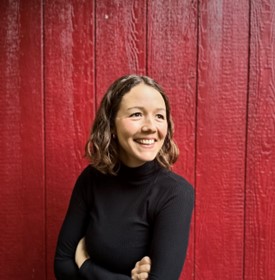
Kelsy Dundas (she/her) is an abolitionist feminist working towards and on dreaming, collective liberation, and transformative survival for sustainable and abundant todays and tomorrows. She has a Bachelor of Arts and a Bachelor of Social Work from Dalhousie University and a Master of Social Work from York University. She is currently a Program Manager at WomenatthecentrE, leading two initiatives to respectively strengthen community capacity to address the ‘parallel pandemic’ of gender-based violence (GBV)-related brain injury (BI) through a survivor-led support program and build internal team and community capacity to support survivors of GBV.
Nikki Plant
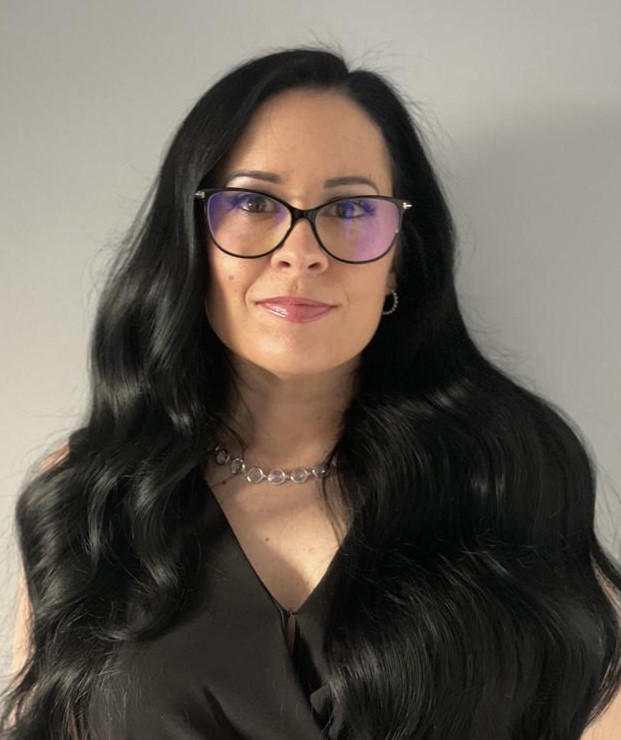
Nikki Plant(she/her) is the Project Coordinator for our project focusing on the intersections of GBV and TBI. As a survivor living with a brain injury, her commitment to exploring the intersection of TBI and GBV resonates deeply. Nikki advocates for tailored support, awareness, and transformative change within this often-overlooked intersection through this project. Nikki believes that authentic change arises when survivors' voices are at the centre of every endeavor, a principle that also echoes in her work on the SurvivorsatthecentrE Guidebook, where she champions the importance of fostering survivor-centred approaches within GBV organizations. Nikki believes the journey to lasting change begins with survivors at the forefront, shaping the inception and development of every program and policy. Nikki has completed her SSW at Sheridan College and is currently pursuing her Bachelor of Social Work at McMaster University.
Other Members of the Project:
Nneka MacGregor (J.D.), Executive Director at WomenatthecentrE
Kelsy Dundas (She/Her), Program Manager
Mandira Arnab Aich (She/Her), Program Manager
Gifty Asare (She/Her), Director of Research & Community Engagement
Nikki Plant (She/Her), Project Coordinator
Émilie Lesage (She/Her), Bilingual Peer Support Navigator (FR/EN)
Somayya Moollabhai (She/Her), Peer Navigator
Rifaa Carter (She/Her), Peer Navigator
Deirdre Reddick (She/Her), Peer Navigator
Chinenye Chikelu, Peer Navigator
Gifty Asare (PhD), Director of Research and Community Impact
Tony Todorova, Research Associate
Amy Kieftenburg, Research Associate
Natalie Rzeszutek, Research Associate
Dr. Angela Colantonio (PhD, Registered Occupational Therapist (Ont.), Senior Scientist on the Acquired Brain Injury and Society team
